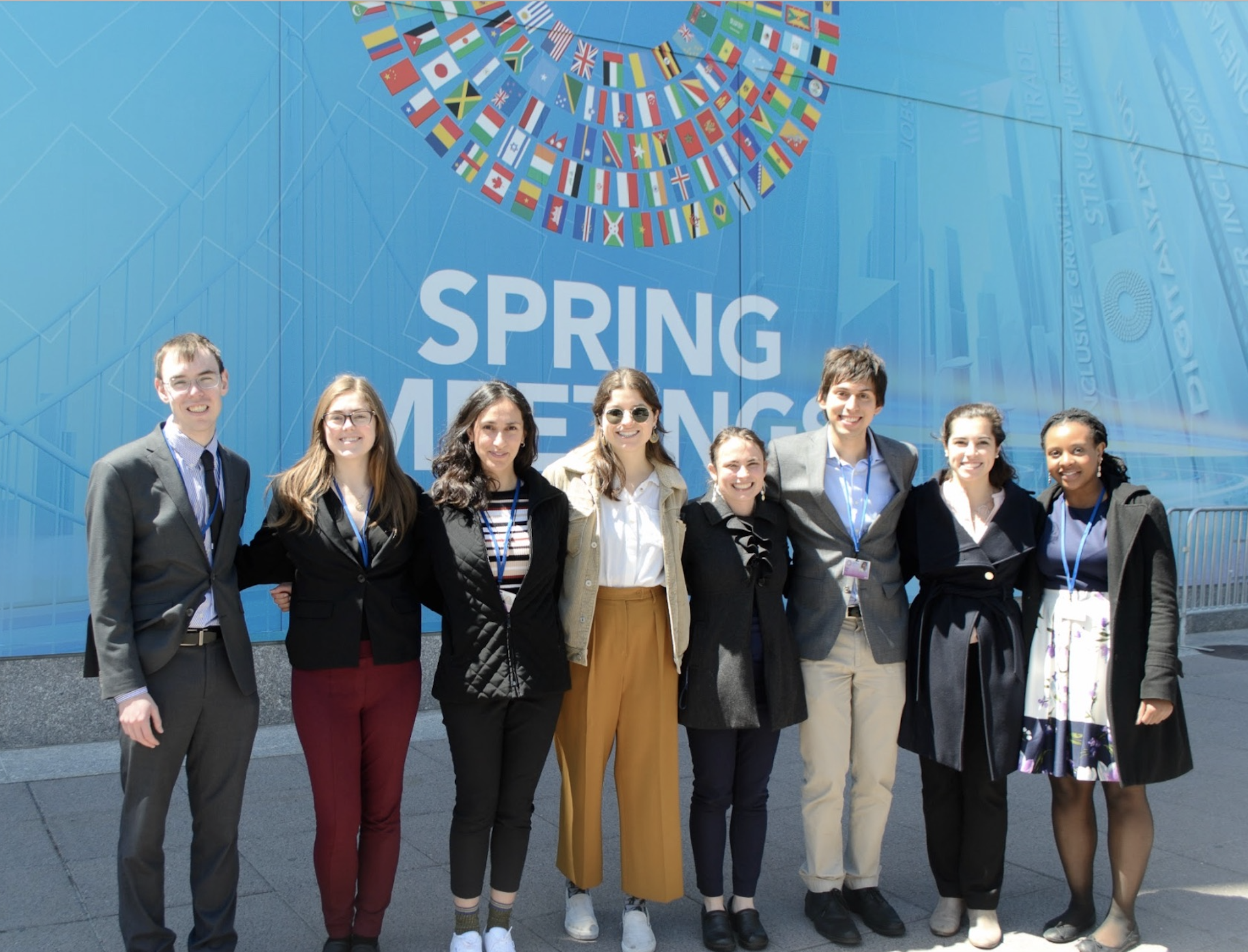A delegation of 10 young people (ages 18-28) from Washington D.C., Maryland, and Virginia will attend the World Bank Annual Meetings from October 13th – 19th in Washington, D.C. to advocate for climate justice and stand in solidarity with frontline communities in World Bank client countries. The World Bank’s post-2020 climate plan released in December exposed major gaps and contradictions in the Bank’s commitment to stopping the climate crisis. The Bank has failed to fully divest from fossil fuels or set a portfolio emissions target that aligns with the 1.5°C warming limit set by the Paris Climate Agreement. In its policies, investments, and leadership appointments the Bank has time and again prioritized the interests of the polluting elite.
SustainUS Delegation to the 2019 World Bank Annual Meetings
As young people in the US, why do we care?
The United States has the most voting power within the World Bank, and US youth have the right and moral responsibility to hold the World Bank accountable to the future it finances and impacts the people around the globe. Though we’ve made progress – in the time since we started organizing, the Bank has agreed to stop financing coal – the World Bank has refused to fully divest from oil and gas or align its investments with the 1.5°C warming limit set by the Paris Climate Agreement. Instead, it is implementing a program of massive privatization, disempowering client countries, and building a world in which it will become harder and harder for communities to adpat to the climate crisis.
In its policies, investments, and leadership appointments the Bank has time and again prioritized the interests of the polluting elite over those they claim to be serving. We do this work with a vision of global justice, aware that the current structure of the World Bank perpetuates power structures that benefit the Global North over the Global South, and that the root of the problem goes beyond the climate crisis.
Who are we?
The SustainUS World Bank Program was founded in the spring of 2017. SustainUS recognized that youth and youth advocates had close to zero presence at the Bank meetings. At that time, the World Bank was still actively funding all fossil fuels, with the exception of direct upstream investments in coal. A pilot delegation attended the 2017 World Bank Spring Meetings and a full delegation attended the 2017 Annual Meetings and 2018 Spring Meetings.

We’ve made real progress so far: since we began our advocacy at the World Bank in 2017, the Bank has committed to divest from upstream oil and gas, and last year finally agreed to close a major loophole in coal finance. Unfortunately, the post-2020 climate plan they released in December exposed major contradictions and gaps in their climate policies.
SustainUS worked on the ground all year at the Bank headquarters in DC and on Capitol Hill, fighting for a Bank that will allow me and my generation to have a future. We have been fighting for a Bank that invests in clean, renewable, and democratic energy, rather than one that panders to corporate fossil fuel interests around the world. Our delegation members stood up to challenge Bank officials at an Executive Director Roundtable in April, and took our advocacy a step further later on in the year by meeting with key Senators on the committee that appropriates money to the World Bank.
What are the World Bank Meetings?
The World Bank Group (WBG) is made up of five international finance organizations that leverage over $60 billion in loans and aid annually. The stated mission of the WBG is to “end extreme poverty and promote shared prosperity in a sustainable way.” Every fall, the governing body of the World Bank Group holds Annual Meetings to discuss their work on international economic development and finance. The Annual Meetings offer a chance to engage with delegates from 189 member countries as well as the broader general public. Thousands of people attend these meetings, including a substantial number of civil society organizations (CSOs) from around the world. The official governing body meetings are October 13th-15th, but many of these meetings are not open to civil society. Instead, from October 9th-13th a series of panels and roundtables are held to engage civil society and press on the bank’s work.
What are our goals?
- Make World Bank meetings accessible to young people from D.C., Maryland, and Virginia facing struggles of environmental justice and financialization parallel to global issues of development policy.
- Train, educate, and build a community of support among a group of 10 young people from the District of Columbia, Maryland, and Virginia. Trainings will be facilitated by partners with expertise in climate justice, storytelling, media engagement, advocacy, and development finance policy.
- Work in solidarity with youth from frontline communities in World Bank client countries, uplifting and amplifying their demands and needs. Build lasting, transnational partnerships.
- Provide resources and support for action on Indigenous People’s Day, which falls on the first day of the Annual Meetings.
- Hold the World Bank accountable to passing policies in line with 1.5ºC, including explicit, measurable commitments to stop the financing of all fossil fuels and fossil fuel related industries and scaling up investments in distributed renewable energy.
- Expose and educate our generation about the undemocratic, unchecked power of the World Bank and similar multilateral development banks. Tell the story of how these banks could severely inhibit our fight for climate justice by privileging the interests of big-polluters.
- Be the direct and creative action arm of the Big Shift Global Coalition.
If you have any questions, please email Beverly Harp (beverly.harp@sustainus.org).


